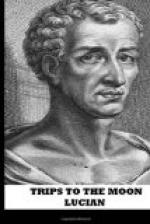We sailed by several places, and at length reached the new colony of the Morning-star, where we landed and took in water; from thence we steered into the Zodiac; leaving the Sun on our left, we passed close by his territory, and would have gone ashore, many of our companions being very desirous of it, but the wind would not permit us; we had a view, however, of that region, and perceived that it was green, fertile, and well-watered, and abounding in everything necessary and agreeable. The Nephelocentaurs, who are mercenaries in the service of Phaeton, saw us and flew aboard our ship, but, recollecting that we were included into the treaty, soon departed; the Hippogypi likewise took their leave of us.
All the next night and day we continued our course downwards, and towards evening came upon Lycnopolis: {97} this city lies between the Pleiades and the Hyades, and a little below the Zodiac: we landed, but saw no men, only a number of lamps running to and fro in the market-place and round the port: some little ones, the poor, I suppose, of the place; others the rich and great among them, very large, light, and splendid: every one had its habitation or candlestick to itself, and its own proper name, as men have. We heard them speak: they offered us no injury, but invited us in the most hospitable manner; we were afraid, notwithstanding: neither would any of us venture to take any food or sleep. The king’s court is in the middle of the city; here he sits all night, calls every one by name, and if they do not appear, condemns them to death for deserting their post; their death is, to be put out; we stood by and heard several of them plead their excuses for non-attendance. Here I found my own lamp, talked to him, and asked him how things went on at home; he told me everything that had happened. We stayed there one night, and next day loosing our anchor, sailed off very near the clouds; where we saw, and greatly admired the city of Nephelo-coccygia, {98a} but the wind would not permit us to land. Coronus, the son of Cottiphion, is king there. I remember Aristophanes, {98b} the poet, speaks of him, a man of wisdom and veracity, the truth of whose writings nobody can call in question. About three days after this, we saw the ocean very plainly, but no land, except those regions which hang in the air, and which appeared to us all bright and fiery. The fourth day about noon, the wind subsiding, we got safe down into the sea. No sooner did we touch the water, but we were beyond measure rejoiced. We immediately gave every man his supper, as much as we could afford, and afterwards jumped into the sea and swam, for it was quite calm and serene.




